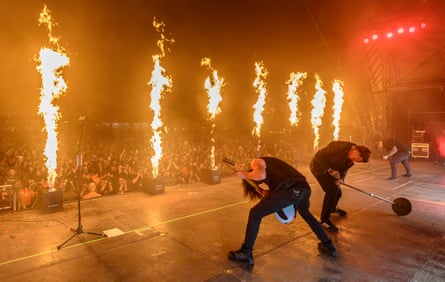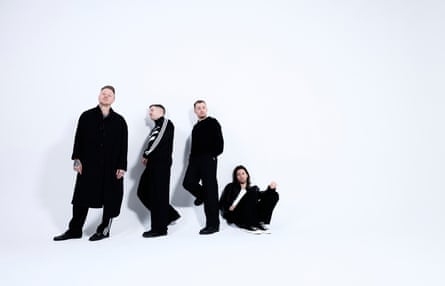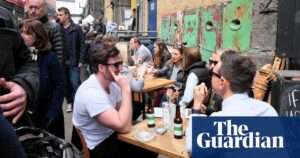In a world of low royalties and short attention spans, not many bands make it to 11 albums, much less have their 11th be their masterpiece. But over the course of 20 years, the metal quartet Architects have inched towards this milestone. The Sky, the Earth & All Between sets out its scale in its title, where gigantic pop choruses soar over hellish chasms of churning noise, resulting in the most consistently sublime British rock album of this decade. The band are now at their arena-filling, Metallica-supporting peak, adored by millions.
“But it means nothing,” says frontman, Sam Carter. “Because you don’t believe it. If you can’t access that part of you that lets it in, then it’s pointless.” Drummer and lyricist, Dan Searle, is equally downcast. “I punish myself, I loathe myself,” he says evenly, blinking behind his glasses. “I feel like I’m shit at everything.” Across two decades, the band have been buffeted by poor mental health, creative differences and an instance of particularly traumatic grief. While the pair are quick to joke during our long conversation in a London photo studio, and are clearly ravenously ambitious, I have never met a rock band as candid about their frailties.
They say it took four albums even to get going, having formed the band in Brighton in 2004 as teenagers playing jittery mathcore. “I remember thinking if we don’t make it with our fourth record, we’ll have to get normal jobs,” Searle says. The next four were classics of British metalcore, the genre in which the heaviness of metal is played at the pace of hardcore punk. Carter was the focus, bellowing their songs in a racked, occasionally melodious manner, punctuated by his trademark disgusted “blegh!”, like a man spitting out a hairball. “I’m filling my body with adrenaline; there’s not a lot of oxygen going to my brain because it’s all coming out of my mouth,” he says of his singing style.
But the band’s creative centre was Searle’s twin brother, Tom, the guitarist and songwriter. His lyrics took aim at societal ills: whale hunting, religious fundamentalism, the Fukushima nuclear disaster, the treatment of Edward Snowden. When Tom contracted skin cancer, the experience seeped into his lyrics, which confronted disease and mortality. After three years with the illness, he died in 2016, at 28, during the making of Architects’ eighth album, Holy Hell. His grief‑stricken brother made the decision to take over the songwriting. “I was completely clueless,” Searle says, with Carter describing “a lot of trial and error, working relentlessly”.
They completed Holy Hell, now full of songs that reckoned with Tom’s death, which they then had to perform on tour. “It was too much,” Carter says. “There’s some real trauma there that we’re still working through – but for two years we were doing it on stage every night. You have to get into that headspace of truth and honesty – and now I’m crying on stage. I don’t want to have that be what a good Architects show is, everyone grieving together. It’s brutal.”
Searle adds: “Unfortunately, there’s a portion of our audience who think we’re the grief band: ‘Ooh, we like that band crying and talking about how their brother has died.’ And we get frozen in time – it’s almost like they want us to be a parody of it, wheeling out this grief act. But I would say we’ve moved on with our lives.”
Carter says: “You have to take the lessons from it … to try to be a better human, to live my life better and cleaner and happier. And live it for him. Now, when I have days where there is a lot of grief, I’m quite grateful for it, because it means he’s still there. But performing [grief] is difficult.”
The recalibration after Tom’s death, with the addition of the guitarist Josh Middleton, meant Architects became a different kind of band: grander and more commercial. Carter jokes that they went from being “griefcore” to “climate-change-core”; their next album, For Those That Wish to Exist, considered our violated planet. Powered by the monolithic yet grooving hit single Animals, it went to No 1 in the UK, surpassing their previous high of No 15. “Really, we should be touring and just playing Tom songs, and putting in a few of our post-Tom songs that no one really likes,” Searle says. “The fact that we’ve been able to not just survive, but thrive, is insane to me.”
But the follow-up, The Classic Symptoms of a Broken Spirit, only scraped the Top 20. “It was like when a football team wins the league and it’s very hard for them to do it again the next year,” Searle says. “There’s almost a cockiness that seeps in, where you just lower your standard a little bit.” They asked Middleton to leave – “We said: look, you’re not enjoying this” – and slimmed down to a quartet.

To continue the football analogy, they benefited from the loan of a player who was out of contract: Jordan Fish, the producer-keyboardist who had turned Bring Me the Horizon from metalcore darlings into mainstream phenomenon, but had recently left the band. Searle, Carter and Fish thrashed out the songwriting on The Sky, the Earth & All Between, then recorded the results with the band’s longtime bassist, Alex Dean, and guitarist, Adam Christianson. The band were “much more cut-throat” now, Searle says, constantly asking: “Is this really good enough?” The result is a skip‑free album – any track, aside from the outrageously hardcore Brain Dead, could be a single – on which they angrily castigate themselves, online discourse and even their fans.
But Searle admits that, in his mid-30s and now settled in Devon with his wife and children, he finds it “harder and harder to find authentic places to be angry from” – even the climate crisis. Surprisingly, for a man who once confronted polluters with lyrics including: “You wanna make your hell a reality / Black lungs for the young if they dare to breathe,” he says he has “an issue with the constant doom and gloom surrounding the future, especially having young kids”.
He mentions a Christmas lantern parade in his town, which Extinction Rebellion joined, toting banners that read: “The planet is burning”. “Do you really need to shove this down the throats of these kids? You’re just scaring everyone; there’s already loads of terrible mental health. There’s this constant message of: there is no future. At a point, it feels counterproductive.”
Carter agrees: “You can’t walk around the house with the kids being like” – he points a finger downwards like a pompous father – “you’re fucked.” But you have the very same doom and gloom in Architects songs, I say. “But our music isn’t for six-year-old children!” Searle counters. Carter deadpans: “People who listen to Cannibal Corpse and stuff like that would say our music is for six-year-olds.”
He smiles with real warmth, his open book of a face spread wide. At one point, he speaks of wanting to “localise” his life – “do the shopping for the old people on my close” – and you can easily imagine this kindly metalhead popping out to get them some fondant fancies.
Regarding his own anger, though, Carter says he is the opposite of Searle: “I’m ready to go.” Where does it come from? “I’ve got quite high ADHD, so if I’m sad, I’m really sad, and if I’m angry, I’m really fucking angry. And it can just jump out. I spent so much of my life hating that about myself. Now, I realise it’s what makes me me.”
He says the subjects of Searle’s lyrics have to resonate with him for their songs to work, such as: “Sad things. Awful mental health.” Is that how he would characterise his own mental health? He smiles again, wryly now. “It’s not great – it’s passable. I’ve got it under control, but you’re never healed from it. It’s not a sob story; I’ve lived a happy life for the most part. I’m in therapy every week, antidepressants, exercising, diet – I’m on top of myself. But there are moments when it can be dark.”
Carter says his work with his therapist is focused now on his “inner critic”: “Somewhere along the line, the criticism from fans, or myself, built up this wall of: I’m going to say something horrible about myself before you can. If someone says: ‘You didn’t sing this right,’ I’ll say: ‘I already know that.’ You can’t hurt me, because I’ve hurt myself.”

To change his mindset, he reminds himself of the “indestructible-feeling” teenager who joined the band: “I’m trying to get that childlike energy back, because that does get pushed away with pressure.”
One new song, Seeing Red, sarcastically confronts those critical fans (“I’ll never grow tired of your great advice”), but Searle admits that the band’s frustrations “come from a place of total weakness and insecurity”. Other new Searle lyrics read: “You’re blissless / I see the fangs, you fucking snake … You devil, you hypocrite.” I thought he wasn’t as angry now?
“I’m talking about my own mind: my ego, my anxiety, the way I make myself do things I shouldn’t do,” Searle says. “I get really hard on myself about how difficult I’m making my wife’s life sometimes; I can see I’m not being the best dad, the best husband. I just feel like I could be better and I’m letting myself down. But it’s not necessarily a bad quality to have – it’s essential for changing and growth.”
The lead single, Whiplash, turns the anger outwards, to “the online discourse from the left and the right, killing each other over any sort of difference of opinion”, Searle says. “People like to pretend they know what other people believe. We’re all looking for a ‘gotcha’ moment, a dunk on someone, and it’s so counterproductive.”

It was inspired in part by a brush with cancellation in January 2024, when Christianson reposted a transphobic post on X. He quickly excused it as a “total accident”, but some people had already made up their minds. “They wanted Adam crucified in the street, with no job,” Searle says, contempt in every word. “Anything less than that would be an act of blatant transphobia.”
One of those people, it turns out, was Carter. “I was a mess,” he says. “I was thinking: he has to go. And then he wakes up and we have a phone conversation.” Christianson said he had made a single errant swipe on his laptop’s touchpad. “He’s my friend who picked me up off the floor when I was in bits crying about Tom; he’s a stepdad of two kids; he’s a saint. But you’ve drawn this picture up of him. [The internet] is such a fucking scary place.”
Later that month, Carter told a crowd in Paris: “No one on this stage judges anybody for their gender, their race and whoever they are in love with.” “And I got dragged for that!” he says now, eyes wide in disbelief. “The right were angry with me. You can’t win.”
I point out that Christianson’s error was complicated by him also liking X posts about the “freedom convoy” protests against Covid vaccine mandates in his native Canada, which seemed to indicate support for them. “What if it is supportive?” Searle bats back. “The brother of a good friend of ours in Canada had their bank balance frozen because he’d liked something on Facebook about the convoy. Do we really think that’s good? That’s not the world we want to live in.”
The band aren’t on X any more (apart from a generic promotional account) and are finding other outlets for their existential angst. Searle and his brother were raised as “strict atheists” and heavily ironised Christian imagery fills Searle’s lyrics; alongside grief and climate, “atheist band has been another one of our tropes”, Carter says. But as they head towards 40, that belief is wavering. “I’ve taken enough hallucinogenic drugs that I feel the absurdity of this physical reality is no less absurd than the idea of an afterlife,” Searle says. Carter recently visited temples in Kyoto on holiday and found himself “having a moment. Part of me was more open to not knowing.”
Perhaps, with age, their anger will dissipate, too. The Sky, the Earth & All Between closes with Chandelier, which Searle wrote from a place of despondency: “No more lies if I disappear / Just one less light on the chandelier,” goes the chorus. Not only did Searle grapple with how it would be received – “This feeling of responsibility: am I green-lighting suicide for young troubled people?” – but also he worried it was simply “too bleak”. But then, “after we finished it, I completely reinterpreted it in my own head. The chandelier is life and existence. One day, I won’t be here, but life will be.” He looks genuinely serene.
Source: theguardian.com





















